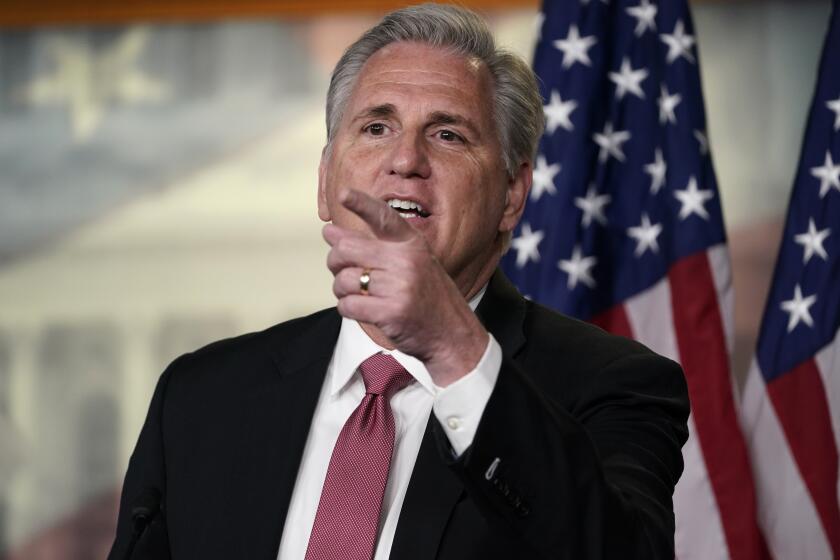Column: Who’s lying about the GOP’s plans to cut Social Security? The GOP, of course

- Share via
President Biden has congressional Republicans all asquirm as he conducts a post-State of the Union speech national tour.
Why? Because Biden has doubled down — or as Fox News has it, “tripled down” — on his assertion during the speech that the GOP has been planning to cut Social Security.
Not so, they say. Never happened. Sens. Mike Lee (R-Utah) and Rick Scott (R-Fla.) were even caught on camera during the speech wearing “Who, me?” expressions of injured innocence.
It will be my objective to phase out Social Security, to pull it out by the roots.
— Sen. Mike Lee (R-Utah), during his 2010 campaign for the Senate
Unfortunately for them, we have the evidence, as does Biden. Cutting Social Security along with Medicare has been part of the Republican platform for decades.
As I’ve reported before, they often hide their intentions behind a scrim of impenetrable jargon, plainly hoping that Americans won’t do the necessary math to penetrate their subterfuge.
Get the latest from Michael Hiltzik
Commentary on economics and more from a Pulitzer Prize winner.
You may occasionally receive promotional content from the Los Angeles Times.
Let’s take a jaunt through the GOP approach to Social Security and Medicare.
Start with their description of these programs as “entitlements,” which they’ve tried to turn into a dirty word. The truth is that they are entitlements, in the sense that most Americans have been paying into these programs for all their working lives, mostly through the payroll tax. So, yes, they’re “entitled” to receive benefits in return.
Republicans, including former Senate Majority Leader Mitch McConnell (R-Ky.), have consistently blamed the federal debt on “entitlements” — never mind that their 2017 tax cut for the wealthy has blown a multitrillion-dollar hole in the budget.
They know they’re on thin ice with the public when they talk about benefit cuts, which is why Sen. Joni Ernst (R-Iowa) once recommended discussing their ideas only “behind closed doors.”
Now we can turn to the specifics of Lee’s and Scott’s plans. In widely circulated videos from Lee’s first successful Senate campaign in 2010 he can be seen and heard stating as follows: “It will be my objective to phase out Social Security, to pull it out by the roots.” He said that was why he was running for the Senate, and added, “Medicare and Medicaid are of the same sort. They need to be pulled up.”
As for Scott, his 12-point “Rescue America” plan, issued last year, included a proposal to sunset all federal legislation after five years. “If a law is worth keeping, Congress can pass it again.” The implications for Social Security and Medicare, which were created by federal legislation, were unmistakable — so much so that the proposal made Republican officeholders’ skin crawl.
Hiltzik: Mike Pence, would-be president, has a plan to kill Social Security. It will cost you
George W. Bush’s Social Security privatization plan crashed and burned in 2005. Mike Pence wants to revive it, and you’ll pay dearly.
McConnell disavowed the proposal on the spot and has continued to do so, telling a home-state radio host after the Biden speech that the sunset provision is “not a Republican plan. That was the Rick Scott plan.”
That said, it’s a priceless foil for Biden. When Republicans brayed during his speech that he was lying about it, he offered to make Scott’s manifesto available to anyone who called his office for it. At one of his subsequent appearances, a copy of Scott’s plan was placed on every seat.
The GOP can’t easily wriggle away from its intentions. Let’s examine the fiscal 2023 budget proposal issued by the Republican Study Committee, a key policy body, last June under the title “Blueprint to Save America.”
This plan would increase the Social Security full retirement age, which today is 66 or 67 (depending on one’s year of birth), to 70 by 2040. According to Kathleen Romig, the Social Security expert at the Center on Budget and Policy Priorities, this would translate into a 20% cut in lifetime benefits compared with current law.
As I’ve reported before, raising the full retirement age is a Trojan horse that would affect all retirees across the board, but harm Black workers, lower-income workers and those in physically demanding jobs the most.
It would create particular hardships for those choosing to retire early and collect their benefits prior to their full retirement age.
Doing so exacts a lifetime reduction in monthly benefits, based on a formula aimed at equalizing the lifetime benefit among those who retire early, those who wait until their full retirement age, and those who defer collecting until that age (they receive a bump-up in benefits for every year they delay, topping out at age 70).
Raising the full retirement age to 70, Romig calculates, would mean that retirees who start collecting at the minimum age of 62 would receive only 57% of their full benefit.
Raising the Social Security retirement age would hurt low-income and Black workers. Is that why Republicans love it?
Early retirees are not a small group. Nearly 50% of all male workers, and nearly 52% of female workers, started receiving benefits prior to their full retirement age in 2021, according to data from the Social Security Administration. That rate tends to reflect economic conditions: In the recession year of 2009, for instance, the early claiming rate climbed to about 70% for men and nearly 74% for women.
The Republican Study Committee also would make it harder for disabled workers to qualify for benefits, and would lengthen the period before those who are disabled and younger than 65 qualify for Medicare to five years from two. This falls into the category of balancing the budget on the backs of the most vulnerable members of society.
As for Medicare, the Republican Study Committee proposes raising the eligibility age, currently 65, so it matches the Social Security retirement age. It also would transfer many more Medicare accounts to private insurance. The committee claims this would save money.
Maybe it would do so for the government, but only at the expense of beneficiaries, who would almost surely pay more for their health coverage in the newly extended period before they qualify for Medicare, and then afterward, when they’re in the grip of the private insurance industry.
While wringing its hands over the fiscal challenges of Social Security, the GOP committee ignores the one reform that would shore up its finances: raising the payroll tax on wealthier Americans, who pay a much smaller percentage of their income into the program than middle- and low-income workers.
Instead, the committee proposes to reduce the program’s revenues from the payroll tax. The committee budget plan accuses congressional Democrats of wanting to take “more money away from working-class Americans and small businesses by raising payroll taxes.”
Republican leaders are threatening to take the debt limit hostage unless they get Social Security and Medicare benefit cuts.
This is just thick-sliced baloney. Proposals by Democrats and Social Security advocates more often than not call for raising or removing the cap on the payroll tax, which this year is pegged at 6.2% of wage income up to a maximum $160,200. (Employers pay at the same rate.) Raising or eliminating that cap, obviously, would mean that it’s those earning more than that who would pay more.
The committee also would allow workers to divert some or all of their payroll tax contributions into private retirement accounts. Privatization is, as I’ve reported, the most chuckleheaded and dishonest proposal out there. Most recently it was aired by former Vice President Mike Pence, who seems to have forgotten that in 2005, when it was proposed by President George W. Bush, a similar proposal crashed and burned, for good reason. It makes no more sense today.
It’s true that President Biden hasn’t always been a staunch defender of Social Security and Medicare. In 1995, then-Sen. Biden (D-Del.) proposed freezing all federal spending to balance the federal budget. He specifically included Social Security and Medicare in the freeze.
This record made Social Security advocates nervous when Biden ran for president in 2020. By then, however, his viewpoint had turned completely around. During his campaign, he advocated eliminating the payroll tax cap, flatly ruled out privatization and proposed expanding and increasing benefits. He has unreservedly rejected tying Social Security and Medicare cuts to a raise in the federal debt limit, a concession that Republicans have mentioned demanding.
No one today can doubt Biden’s commitment to protecting these programs from GOP vandalism. But don’t expect the Republicans to give up just yet. And keep your eyes on those closed doors.
More to Read
Get the latest from Michael Hiltzik
Commentary on economics and more from a Pulitzer Prize winner.
You may occasionally receive promotional content from the Los Angeles Times.













